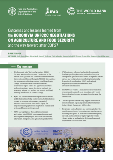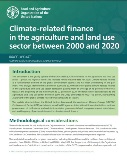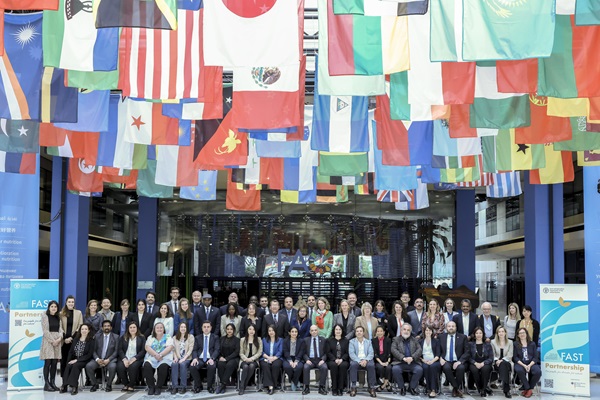
UNFCCC processes
The United Nations Framework Convention on Climate Change (UNFCCC) is one of three conventions that was adopted at the Rio Earth Summit in 1992 to promote a sustainable planet for future generations. The UNFCCC entered into force in 1994 and has near-universal membership with 197 Parties. Its sister Rio Conventions are the UN Convention on Biological Diversity and the Convention to Combat Desertification.
The purpose of the UNFCCC is to harness international cooperation to limit the rise of average global temperatures to minimize the impacts of climate change to enable timely adaptation, avoid threats to food production and ensure sustainable economic development. FAO supports UNFCCC as the central forum for climate change.
The UNFCCC is the parent treaty of the Paris Agreement and the Kyoto Protocol. The ultimate objective of these agreements is to stabilize greenhouse gas concentrations in the atmosphere at a level that will prevent dangerous human interference with the climate system, in a time frame which allows ecosystems to adapt naturally enabling sustainable development.
How FAO supports
Latest publications

Outcomes and lessons learned from the Koronivia UNFCCC negotiations on agriculture and food security and the way forward after COP27
05/05/2023
The Koronivia Joint Work on Agriculture (KJWA) was established at COP23 to address six topics in the agricultural sector's role in climate change. KJWA has contributed to sharing scientific and technical knowledge, but limitations remain in translating outcomes into concrete climate actions.

Climate-related finance in the agriculture and land use sector between 2000 and 2020
26/01/2023
This document is the yearly update of the FAO analysis, “Climate finance in the agriculture and land use sector – global and regional trends” and includes newly released data for 2020. Climate finance is a fundamental element of the global development agenda and has been accelerating in the past years.

Climate Risk Toolbox (CRTB). Quick user's guide
01/12/2022
Countries must strongly invest in climate-proofing and developing early warning and early action mechanisms to reduce the impact of climate risks, disaster risks and build resilience. A key element in sustainable and transformative development in agriculture is ensuring that investments are designed with robust evidence about both past and future climate variability, seasonality, and extremes.
Highlights

Collective challenges require collective solutions FAST
30/04/2024
At a critical time when climate-related development contributions to agrifood systems continue to spiral on a downward trajectory, the Food...

Can climate finance move the needle on gender equality?
08/03/2024
The transition to a just, low-carbon future is possible, but not without women. Today, 1 in every 10 women lives in poverty, without equal access to...
.tmb-th600x400.jpg?Culture=en&sfvrsn=c55aa151_2)
FAO proposes five key actions to address climate-conflict nexus at the United Nations Security Council
14/02/2024
Climate crisis and conflicts are becoming increasingly intertwined, feeding into one another to perpetuate hunger and poverty. Urgent action and innovative...




